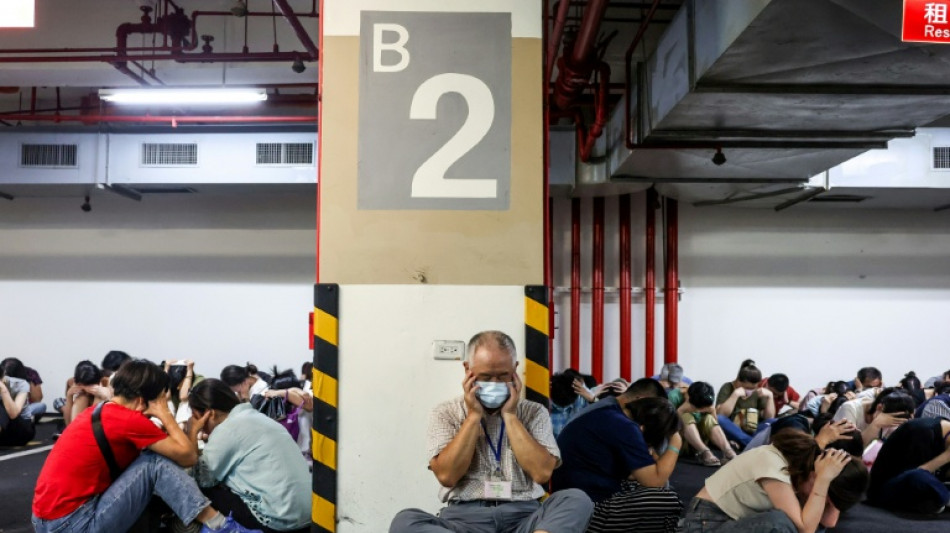
-
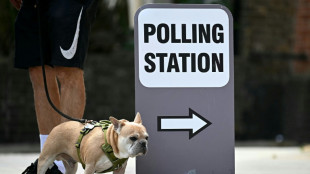 UK to lower voting age to 16 in general elections
UK to lower voting age to 16 in general elections
-
Sri Lanka returns orphaned elephants to the jungle
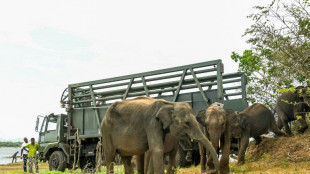
-
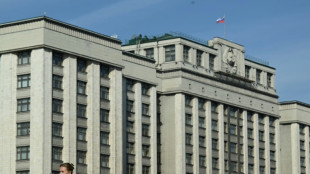 Russian deputies back fines for clicking on 'extremist' content
Russian deputies back fines for clicking on 'extremist' content
-
Ukraine's new PM: a deal-maker as head of wartime government

-
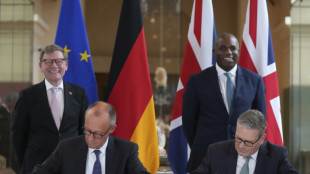 Britain seeks German help against people smuggling gangs on landmark Merz visit
Britain seeks German help against people smuggling gangs on landmark Merz visit
-
Fake AI videos of R. Kelly, pope spread cult of Burkina junta chief

-
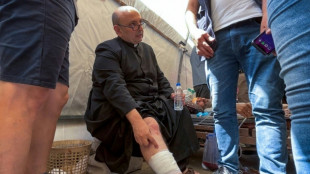 Israeli strike on Gaza's only Catholic church kills two
Israeli strike on Gaza's only Catholic church kills two
-
Rare Gandhi portrait smashes estimate to sell for nearly £153,000

-
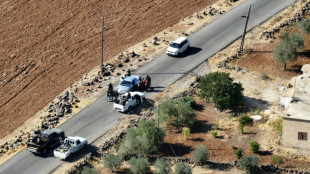 Syria troops quit Druze heartland leaving bodies on streets
Syria troops quit Druze heartland leaving bodies on streets
-
South Africa warns global turmoil threaten development goals

-
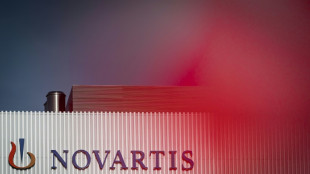 Novartis first half net profits up 29 percent
Novartis first half net profits up 29 percent
-
Strike on Gaza's only Catholic church injures several people
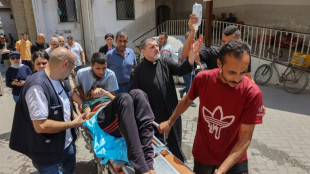
-
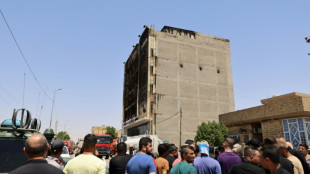 Iraq shopping mall fire kills more than 60
Iraq shopping mall fire kills more than 60
-
Taipei holds air raid drill to prepare for Chinese attack
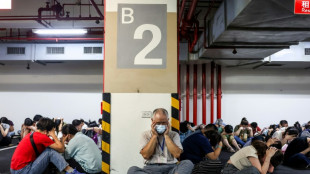
-
 Migration, defence on agenda for German chancellor's first UK visit
Migration, defence on agenda for German chancellor's first UK visit
-
Swatch profits plunge on weak China sales
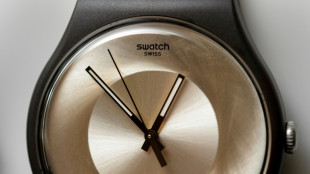
-
 Kluivert's Indonesia to face Saudi Arabia in World Cup qualifying
Kluivert's Indonesia to face Saudi Arabia in World Cup qualifying
-
EasyJet boss hits out over French air traffic walkouts
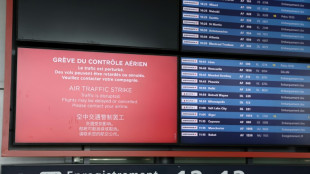
-
 Stocks extend Wall St gains, 7-Eleven owner plunges
Stocks extend Wall St gains, 7-Eleven owner plunges
-
Wallabies Tupou, Daugunu added to Pasifika squad for Lions clash
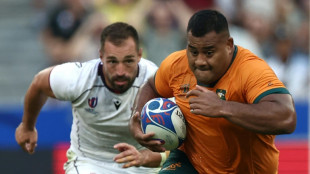
-
 New Zealand, France make mass changes to sides for third Test
New Zealand, France make mass changes to sides for third Test
-
54 people killed in 24-hours of heavy monsoon rain in Pakistan
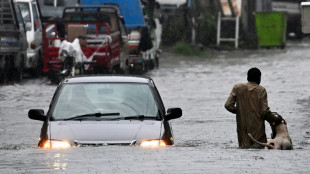
-
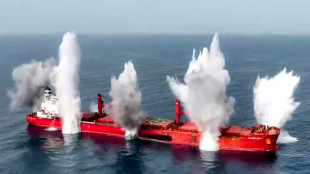 'I thought I was going to die': sailor recounts Huthi attack in Red Sea
'I thought I was going to die': sailor recounts Huthi attack in Red Sea
-
Three dead as South Korean region hit by most rain in 120 years
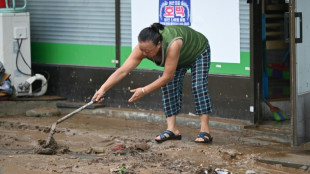
-
 Lions leave out Farrell, Pollock for first Australia Test
Lions leave out Farrell, Pollock for first Australia Test
-
Asian stocks extend Wall St gains, 7-Eleven owner plunges

-
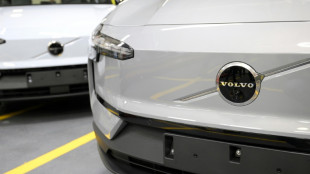 Volvo Cars swings into loss on electric vehicles, tariffs
Volvo Cars swings into loss on electric vehicles, tariffs
-
US senators approve $9 billion of Elon Musk's federal cuts

-
 'Proud' Litton lauds Bangladesh's T20 triumph in Sri Lanka
'Proud' Litton lauds Bangladesh's T20 triumph in Sri Lanka
-
French army to leave Senegal amid Africa downsizing

-
 Farrell, Pollock miss out from Lions team named to face Australia
Farrell, Pollock miss out from Lions team named to face Australia
-
Chinese farmer makes splash with homemade submarine
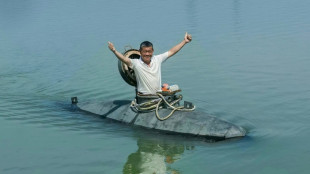
-
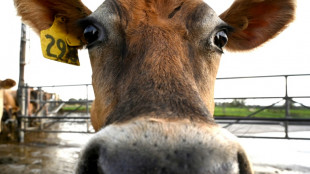 Dairy giant New Zealand endures butter price shock
Dairy giant New Zealand endures butter price shock
-
Taiwan's TSMC says second quarter profit up 60%

-
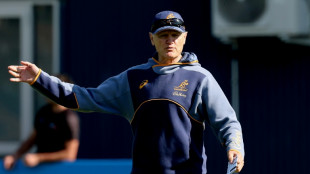 Schmidt backs 'scavenger' Champion De Crespigny against Lions
Schmidt backs 'scavenger' Champion De Crespigny against Lions
-
Leaking pipes as climate warms: Bulgaria faces water crisis
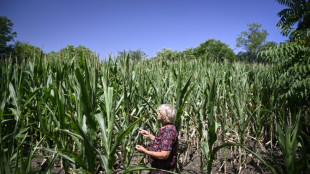
-
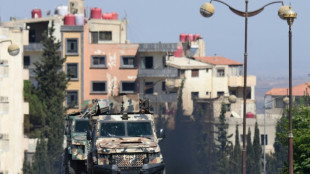 Syria says local factions to secure violence-hit Sweida
Syria says local factions to secure violence-hit Sweida
-
Air India probe of Boeing 787 fuel control switches finds no issues
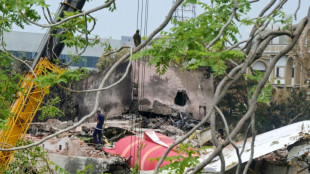
-
 Lead actors announced for 'Legend of Zelda' movie
Lead actors announced for 'Legend of Zelda' movie
-
China moves to tame 'irrational competition' as EV price war persists

-
 Champion De Crespigny handed surprise Wallabies debut in Lions Test
Champion De Crespigny handed surprise Wallabies debut in Lions Test
-
'Shop local': Bad Bunny brings tourism surge to Puerto Rico

-
 Japan's Sega eyes return to 1990s gaming glory
Japan's Sega eyes return to 1990s gaming glory
-
Asian stocks struggle as traders eye Fed saga, trade war

-
 McIlroy on home turf as Scheffler seeks satisfaction at British Open
McIlroy on home turf as Scheffler seeks satisfaction at British Open
-
Messi's multi-goal streak ends as Cincinnati beats Miami 3-0

-
 Merz makes first trip to London amid warming post-Brexit ties
Merz makes first trip to London amid warming post-Brexit ties
-
AI-powered 'nudify' apps fuel deadly wave of digital blackmail

-
 Mexico City vows to tackle gentrification after protests
Mexico City vows to tackle gentrification after protests
-
French town withdraws pop festival funding over Kneecap appearance


Taipei holds air raid drill to prepare for Chinese attack
Taipei came to a brief standstill on Thursday when air raid sirens forced people off the streets and into underground shelters in a rehearsal for a Chinese attack.
The annual civilian drill is being held in cities across Taiwan this week, alongside military training, to prepare the self-governed island for a potential Chinese invasion.
Communist China has never ruled Taiwan but Beijing insists the island is part of its territory and has threatened to use force to bring it under its control.
Sirens sounded across Taipei at 1:30 pm (0530 GMT), bringing the capital city of 2.5 million people to a halt for half an hour.
Police waving batons stopped motorbikes, cars and public buses on the streets and people were directed into shelters, including basements and subway stations.
Some people retreated into office buildings for the duration of the exercise.
Tracy Herr, 50, was on her way to a temple when she heard the air raid siren. She went to a nearby subway station where others were sheltering.
Pointing at a group of young women sitting on the floor and chatting, Herr said Taiwanese people had "lived comfortably for too long" and some didn't take the air raid drill seriously.
The drills also involved simulating wartime aid distribution and a mass-casualty event.
Dozens of people lined up at three distribution points to receive bags of rice, cooking oil and salt.
Taiwanese President Lai Ching-te has sought to raise public awareness of the threat posed by China since taking office last year.
"Each drill allows our country to further enhance its ability to defend itself," Lai said on Thursday.
While the exercises were "not intended to provoke", Lai said the constant threats to Taiwan meant "we have no choice but to stay fully prepared".
- 'Reality of modern warfare' -
Taiwan is keen to show the world, especially its key security backer Washington, that it is serious about boosting its defence capability.
Taiwanese regular troops were joined by the largest mobilisation of reservists for the 10-day "Han Kuang" military drills, which end on Friday.
Rather than only repelling a Chinese attack on its shores, Taiwanese troops this year have also practised fighting invading forces in city streets.
"It is as much training as acclimating the Taiwanese population to the reality of modern warfare," said Kitsch Liao of the Atlantic Council, a US think tank.
Heavily armed troops carrying US-provided anti-aircraft Stinger missiles stormed Taipei's metro system in a night-time exercise.
High-tech mobile missile launchers from the United States have also been positioned around the capital and elsewhere, in full view of the public.
Shoppers in a Taipei supermarket also recently became participants in a drill simulating a Chinese missile strike on the city.
"I didn't know there was going to be a drill," Yang Shu-ting, 70, told AFP.
"My heart was beating very fast and I was inevitably nervous. I think the point is to let you know where you should hide if something happens."
Troops have also simulated various scenarios, including "grey zone harassment" -- tactics that fall short of an act of war -- and "long-range precision strikes", defence officials have said.
Several minor collisions involving military vehicles during the exercises highlighted the challenge of manoeuvring through Taiwan's narrow streets.
Defence expert Chieh Chung said such mishaps were "difficult to avoid" in urban areas.
"In Taiwan, many roads and bridges create significant limitations for armoured vehicles when they move through," said Chieh, a researcher at the Association of Strategic Foresight in Taipei.
"So this becomes a problem and obstacle for both attacking and defending forces."
X.AbuJaber--SF-PST
